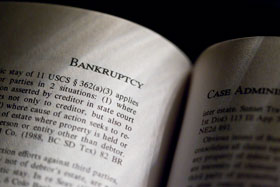Filing Proofs of Claim in Atlanta, Georgia Bankruptcy Cases
October 7, 2014 | Category: Bankruptcy Litigation, Chapter 11, Chapter 13, Chapter 7
When an Atlanta, Georgia individual or business files a Chapter 7, Chapter 13, or Chapter 11 bankruptcy case, a lengthy process begins to determine whether and to what extent the debtor’s creditors will be repaid. For a creditor, the first step in that process is to file a “proof of claim”. A proof of claim is a document, typically signed by the creditor or their attorney, which states the amount of the creditor’s claim as of the “petition date” (the date the case was filed), whether the claim is secured by any collateral, and whether the creditor contends that the claim is entitled to “priority” treatment under Section 507 of the Bankruptcy Code.
Rule 3001 of the Federal Rules of Bankruptcy Procedure governs the general provisions that apply to proofs of claim. A creditor filing a proof of claim should use the form promulgated by the Bankruptcy Court or a form that is substantially similar. If the claim is based on written documents (such as promissory notes, contracts, loan agreements, etc.), then those documents (or an explanation of their loss or destruction, if applicable) should be attached to the proof of claim form and filed along with it. If the claim is secured by collateral, then the documents or other evidence demonstrating the existence of the creditor’s security interest should be attached as well.
Rule 3002 of the Federal Rules of Bankruptcy Procedure provides the deadlines for filing of claims in Chapter 7 and Chapter 13 cases. Rule 3003 governs the filing of claims in Chapter 11 reorganization cases. A crucial difference between Rule 3002 and Rule 3003 is that all creditors must file claims in Chapter 7 and 13 cases in order for their claim to be administered (receive payment); in a Chapter 11 case, if the debtor scheduled a creditor’s claim as liquidated, non-contingent, and undisputed, a creditor satisfied with the claim as scheduled by the debtor need not file a claim.
Under Rule 3001, a properly completed and filed proof of claim is deemed on its face to constitute evidence of the validity and amount of the claim. However, any claim is subject to objection by the trustee, debtor, or other creditors in a case. When a claim is objected to, the Bankruptcy Court will conduct an evidentiary hearing to determine the validity of the claim, unless the dispute is settled and such settlement is approved by the Court.
Even the seemingly simple act of filing a proof of claim can be fraught with difficulties. The assistance of skilled counsel can streamline the process and help to aid in the best treatment possible of a claim. Since 1986, The Rothbloom Law Firm has represented individuals, financial institutions, and corporations in Cobb, Fulton, Gwinnett, Cherokee, DeKalb, and all metro-Atlanta counties as creditors in Chapter 7, Chapter 11, and Chapter 13 bankruptcy cases. Our top-rated attorneys, Howard Rothbloom and Adam Herring, provide thoughtful counseling, careful planning, and creative lawyering in helping creditors obtain favorable results in bankruptcy cases. Contact us today to discuss the options available to you when someone who owes you money seeks bankruptcy relief.

